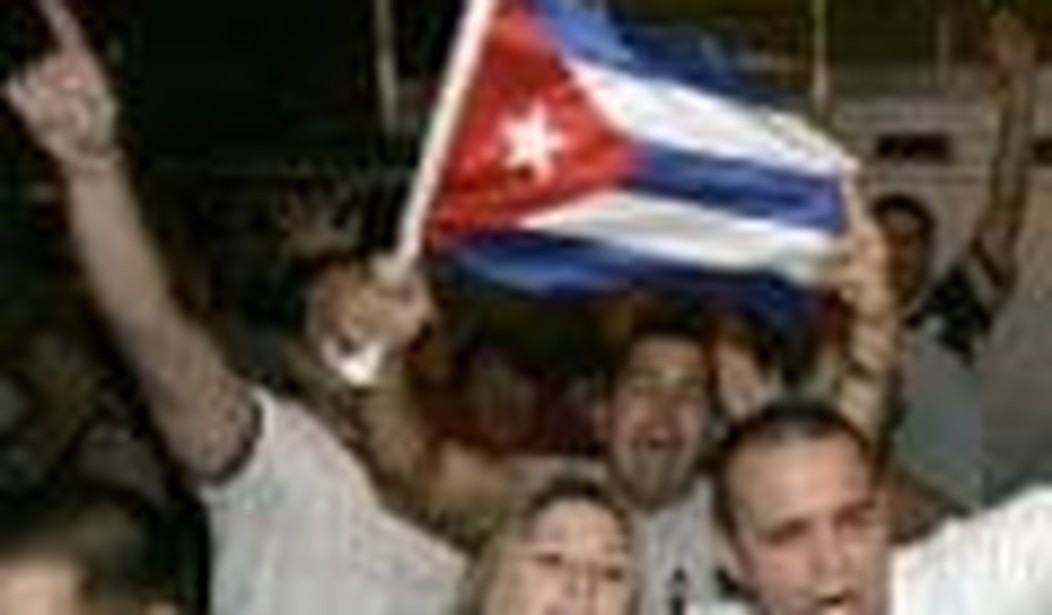For as long as many South Floridians can remember, some politicos and the media, specifically the Miami Herald, have tried to sell the theory that we are witnessing a generational change in outlook among Cuban-Americans that will manifest itself at the ballot box. In particular they allege that younger Cubans are less likely to take a hard line toward the Castro regime and thus less likely to become Republicans. In the past I have disputed this using various sources:
1. A Florida International University poll of Cuban-Americans that shows a remarkably steady proportion of Cuban-American voters registered as Republicans over the last 17 years. That poll has had GOP affiliation among Cuban-Americans ranging between 66% and 69% since 1991.
2. A survey conducted by Sergio Bendixen, a Democratic pollster, for the New Democrat Network, a Democratic think tank. That poll showed an even higher level of Republican affiliation among Cuban-Americans of 72% in September 2006.
3. News reports and scholarly articles about exit polls of Cuban-Americans during presidential elections. Those polls showed that Cuban-American support of Democratic presidential candidates has varied from a low of about 20% for Carter, Clinton in 1992, and Gore in 2000 to a McGovernesque high of about 35% for Clinton in 1996.
4. Actual election results since Ileana Ros-Lehtinen became the first Cuban-American elected to Congress in 1989 with 53% of the vote. The highest any opponent has garnered against the Cuban-American trio of Ros-Lehtinen, Lincoln Diaz-Balart, or Mario Diaz-Balart since then was in 2006 when Democrat Michael Calderin received 41.5% of the vote in Florida’s 25th congressional district. A 17-point spread isn’t even close, and that was among all voters in the district, not just Cuban-Americans, the spread for which was surely higher.
Recently I began to wonder when exactly the folks at 1 Herald Plaza in Miami began to sing that song which by now is very tired, so I did an archive search at Herald.com and looked back as far as their archives go (1982) to find out.
The earliest meaningful article I found on the subject was one from December 1983. It was written by Richard Morin and Barbara Gutierrez and appeared with the following headline: “Dreams, Issues Divide Parents And Children.”
In typical newspaper fashion the story was told through anecdotes. In this case it was the story of Walter Alvarez, a 19-year-old who dreamed “of dirt bikes and cars and girls” and believed “the United States should establish diplomatic relations with the country that his parents fled.” I wonder where Walter Alvarez — who would be 43 today — is, what his party affiliation is, and how he voted in the last congressional and presidential elections.
Even at that early date the Herald was conducting surveys to figure out where there might be divisions among Cuban-Americans. At the time, they were splitting hairs about certain statements with which older Cuban-Americans “strongly agreed” while younger ones simply “agreed”.
The next major piece I found was a column by Tom Fiedler, who was then the Herald’s political editor. Fiedler, who achieved notoriety by breaking the story of Gary Hart’s affair with Donna Rice, effectively ending Hart’s presidential bid, later went on to become the paper’s executive editor. Fiedler’s December 1986 column was headlined: “Cubans Find Young Have New Politics.”
The piece contained more of the same sentiment as the one Morin and Gutierrez had authored three years earlier, but Fiedler built his case on the historical precedent of the generation gap as described by Margaret Mead, the famous anthropologist.
He paraphrased Mead, saying she “developed the theory that Americans had entered a ‘prefigurative’ era in which the teachings of the grandparents and parents were irrelevant to youth.” It’s obvious that neither Mead nor Fiedler were Cubans.
Fiedler also used an anecdote to make his point, describing a rally for Ronald Reagan at the Dade County Auditorium, where Pat Buchanan spoke. He noted that aside from “uniformed Catholic school children invited to sing for the crowd,” there were no young people at the event.
Armed with his proof Fiedler hypothesized that although the generation gap among Americans was, at the time, a thing of the past, Cuban-Americans were experiencing a similar phenomenon:
A generation gap is alive and well there, portending change in cultural and political tastes. The Cuban family, like its American counterpart nearly a generation ago, is in Mead’s “prefigurative state” — where the teachings of the elders are largely irrelevant to the experiences of the young. I don’t mean to sound apocalyptic. I don’t suggest that young adult ethnic Cubans will “drop out, turn on, and tune out.” Nor will they shed their facility for Spanish, their taste for plantanos, or their skepticism for liberal Democrats.
But the value changes that I believe were evident at the Reagan rally and are coming to the Cuban family are significant.
Fiedler continued on, arguing that the need to assimilate into the greater culture was driving young Cuban-Americans to reject the ways of their parents. Fiedler quoted sociologist and longtime Castro apologist Lisandro Perez:
Together, says sociologist Lisandro Perez of Florida International University, these experiences have a tempering effect on the younger Cubans that is going to make them less inclined to engage in the bitterly partisan and personal politicking of their parents.
And Fiedler concluded with these predictions:
Some obvious ramifications for this community flow from this. For one, political candidates for local office will find it less necessary in the future to pass litmus tests on foreign policy.
Democrats won’t find themselves automatically regarded in the Cuban community as closet Marxists or, at best, Communist dupes.
Conversely, Republicans won’t always enjoy the unquestioning loyalty of ethnic Cubans because of the appeal of Ronald Reagan’s anti-Communism.
The virtually indistinguishable hard-line stances that this year’s presidential candidates have taken with regard to Cuba policy are testaments to the fact that those who need Cuban-American votes don’t believe Fiedler’s theory.
Though Fiedler’s theory sounded enticing and plausible, he didn’t account for several phenomena. The first is the concept of retro-acculturation, which Hispanic marketers like me have taken note of. Retro-acculturation is the process by which bilingual, assimilated immigrants and their children embrace and seek to maintain their connections to their cultural heritage. As American culture has accepted Hispanic culture — music and cuisine come to mind — it’s actually cool to be Hispanic for perhaps the first time in American history.
Since anecdotes are seemingly acceptable, I will provide one of my own. When I was sixteen you could not get me to listen to Spanish radio or watch Spanish TV. I was into rock music and all the things non-hyphenated American kids liked. But other experiences shaped me and raised my awareness of my Cubania or Cubanness. Among those experiences was going to college outside of the bubble of Cuban Miami and my Cubania has only gotten stronger ever since. Cuban student associations and grassroots organizations that protest the Castro regime and raise awareness about the Cuban reality are popping up on college campuses across the country.
Another thing that Fiedler grossly underestimated is the pull of Cuba itself. It is my totally unscientific opinion that Cuba has some sort of mystical power over human beings. Since Columbus first set foot on Cuba’s fair shores, and reportedly said that it was the most beautiful land his eyes had ever seen, man has been enchanted and taken by its power to seduce. It’s a power that I believe can actually be transmitted genetically to generations that have never been on the island. Generations like mine.
Lastly, Fiedler failed to account for the possibility that the continuing despicable actions of Castro over the next two decades would galvanize Cuban-Americans repeatedly. Whether it was the sinking of the 13 de Marzo tugboat, killing dozens of Cubans trying to escape the worker’s paradise, including women and children; the downing of the Brothers to the Rescue planes, killing four Cuban-Americans in international airspace; or the jailing of 75 dissidents during the black spring of 2003; the regime’s actions have served as sharp reminders to the younger generations that our parents were right about the evil nature of the regime and that negotiations with such monsters would only prove fruitless.
Tom Fiedler ultimately discredited himself when he famously said that “22 people who listen to Cuban radio” were being stirred up by ”little Chihuahuas nipping at our heels.” The Chihuahuas he was referring to were Cuban-American radio personalities who rallied their substantial audiences to protest the Herald’s unfair witch hunt of Cuban-American journalists who had been moonlighting for Radio Marti, the U.S. government-run station that transmits uncensored programming into Cuba. The “Marti Moonlighters” scandal ended up costing Fiedler’s boss his job and further embattled Fiedler himself, who left the paper several months later.
Though Fiedler is gone, his hypothesis is revived periodically in the pages of the Herald. Much fanfare has been made in the paper of the candidacies of three Democrats who are challenging South Florida’s Republican triumvirate in congress. Still, the objective data show that the generational change that the Herald has been forecasting for more than a generation hasn’t materialized.
Henry Gomez works as an Account Planner at a Hispanic Advertising Agency and Blogs at Babalublog.com. He is 38 years old and was born in Philadelphia to Cuban parents.









Join the conversation as a VIP Member